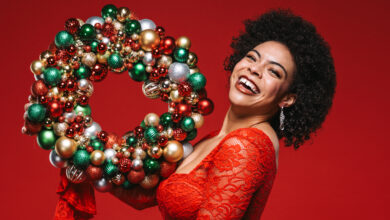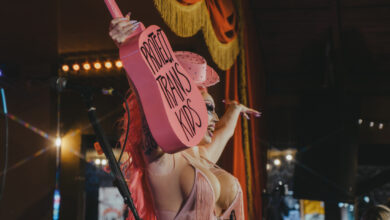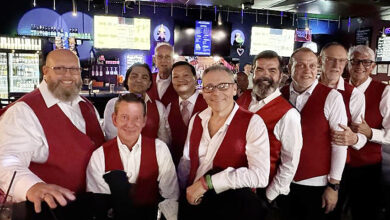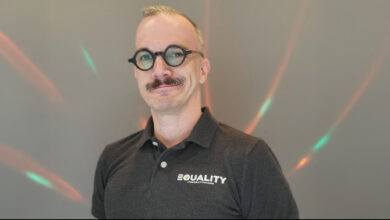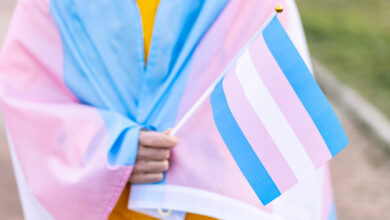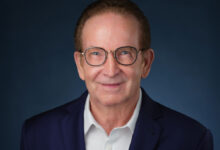
At Some Point, It Won’t Be Visibility, It Will Be Normalcy: Queer Philanthropist of Color Combats Bullying Through Hairstyling
By Josh Watkins
The word “visibility” is defined as the state of being able to see or be seen. Historically, the queer community has always struggled with being seen. But through pride and passion, perseverance and tragedy, we have fought for our right to visibility. In the aftermath of the largest mass shooting in American history that struck our community, being visible has never been so important. OutSmart catches up with Madin Ray Lopez—black, Latino, queer, hairstylist, and philanthropist—to discuss self-love, pride, and visibility. Lopez is best known as the founder of Project Q, a nonprofit based out of Los Angeles that combats bullying by promoting self-esteem and self-love by providing hair services to homeless queer youth.
Josh Watkins: In your own words, what is Project Q?
Madin Ray Lopez: Project Q is a space for homeless queer youth to collapse the social binaries through their individuality. A space for them not to be seen as homeless or as boy or as girl—unless that’s what they choose—but to be seen as who they are. The first communication they have with the world, before [any words are spoken], is the way that they look. If they love how they look, then they’ll [project a positive image] to the rest of the world.
What have you been able to achieve so far, as a nonprofit?
We were just awarded our first grant from the city, and we’re very excited for that. The biggest thing thus far is that I’ve been able to be recognized by bigger organizations that are realizing how important this specific thing is. I did a ticket clinic, where the municipal courts invited all of the homeless queer youth and helped them to get rid of any misdemeanor tickets—loitering, public urination—things that they just accumulate because they don’t have anywhere to go. Los Angeles City Councilmember Mitch O’Farrell took Project Q’s mission and told it to the world. It was really beautiful. He was saying that these kids are being kicked out and left with nothing—and that now they’re our kids and we have to take care of them.
Project Q also has a vintage 1957 Airstream trailer that we’re building to be our mobile self-esteem-building space. That’s where the funds are going. We’re about a year away from achieving that goal, so things like earning a grant really help. We have two fundraisers before the end of the summer to try to match funds from the grant and to continue to grow.
There are so many LGBT organizations that try to deal with bullying. Why did you see a need for Project Q to deal with that?
A lot of these anti-bullying campaigns are mostly based on a see-something-say-something basis, which is great, and I think is the second step in stopping bullying. But the first step is self-love. You [need to expect] to be treated a certain way if you know that you’re worthy of being treated that way. Beyond hairstyling, Project Q works with guided meditation for the youth and with art classes, songwriting classes, and poetry, to help them learn more about themselves to come into the world without fear. We’re going to start implementing life skills as well. How to open a bank account, how to find a credit union—things that might not be taught in a home where they’re not accepted.
What led you to start Project Q?

I came out very early—12 or 13, and then 15, and then 18. I just kind of kept getting pushed back in. There was a thing in the ’90s called reparative therapy, where they try to teach you how to be straight. [Anti-gay churches would] have mixers where the gay boys and the gay girls were supposed to meet and get married. This is why reparative therapy is outlawed in California now.
I was unfortunately pretty brutally abused growing up. I had to be in foster homes and group homes through a lot of my formative years, so I wasn’t really able to process things. At that time, pharmaceutical drugs were the answer to everything.
I started doing hairstyling when I was 16. I went to beauty school and paid for it myself. I took the exit exams to get out of high school. I focused on beauty school, because I knew it was a trade where I could make money and become independent fairly quickly. I didn’t have anything to fall back on. I didn’t have a home to go back to, especially if I wanted to be myself. Project Q started not long after. I’m 29 now, and I started Project Q at around 24 or 25. I started working with queer youth and just realized that it’s what I wanted to do forever.
Where do you see yourself in 10 years?
I’d like to have a couple of different trailers going and have some of my kids running them. I’m working on getting one of my trans girls in school. She started beauty school, but then came out as trans and was kicked out of her home. She wasn’t allowed to be herself and had nowhere to stay at night. So that would be ideal to help a few of the kids become self-sufficient. That would be the best way to go, so they could be taking care of themselves and teaching the next generation. In five years, [I hope] I’m stable and bringing them in; in 10 years, I hope those kids will be stable and bringing other youth in. I think the biggest thing about Project Q besides building self-esteem and self-awareness is creating a community that’s able to pass something on and create a legacy. Being able to create that in our queer community, that’d pull at my heartstrings the most—to have this generation pass that support to the next one. Keeping that momentum going is the goal.
Do you hope to expand Project Q beyond California?
Absolutely. The reason I’d like to make it mobile is to take it to places where visibility is most important. I’m so thankful to live in a state where four of the major cities have Prides. So that would be our first goal, in 2017, to hit all the Prides on the west coast. At some point in the future, I’d love to take it to places where queer people don’t really get love. Although I’m afraid [of possible violence and a lack of financial support], those are roads we will cross when we get there.
What are some of your most memorable experiences with your kids?
I work with all of the youth, but I mainly work with the youth of color. We had this moment where people of all colors were having this really great discussion about skin tone. In our communities, you’re looked down upon if you’re too dark or if you’re too light. Then you throw the whole queer thing on top of that. We had this beautiful talk about how we are all the same. Lining people up according to skin tone only leads to genocide. We went and anointed each other with flowers. It was really beautiful. One of the kids said to me, “You look like me.” [What he was saying was] “Things aren’t okay for me right now, but I look at you and know that things will be okay, because I see myself in you.” That summed it up.
Another memory from an event we held: my sister-in-law was there to make enchiladas, and we had just enough food for the kids and a little more. One of my kids was standing outside and heard someone say they were hungry. He grabbed him by the hand and brought him inside and made him a plate. Then he did it like two more times that day! It was beautiful, and just solidified it. I had like 10 kids there that day, and before they left, they all hugged me and said, “I love you.” There was just so much love going on.

Visibility is extremely important in our community right now. What does “visibility” mean to you?
It means so much. I want to just touch on this concept of “stealth” to explain how much visibility means. Stealth is used by a lot of people in our trans community who want to blend in and have a heteronormative lifestyle—which I think is wonderful. But blending in is also an idea that’s been kind of forced down our throats. Like, “Just don’t be so gay,” which I hear all the time. I feel the opposite way—I’m going to be as gay as possible. I’m gonna hold my wife’s hand and we’re going to make out. Being able to show someone that you can be queer, you can be successful, you can be loved, and you can be yourself. All of those things are the key to happiness. So my visibility creates a space for youth to grow so much further than you and I have. So they do not have to deal with fear. At some point it won’t be visibility, it will be normalcy.
What does “pride” mean to you?
Pride means so many different things. I grew up very Christian, so pride was something I didn’t have. So it really has transformed the way that I think about accomplishments. We’ve come so far as a community—that’s what pride is. We’re not hiding any longer. The bars are no longer the only place [where we gather]—there are book clubs, yoga classes, and all of these other places where we can be ourselves. So pride, to me, means ownership—ownership of how far we’ve come and how far we have to go.
If you could say something to our community about the Orlando massacre, what would you say?
There are a lot of rumors going around about [the murderer] who harmed our community. One of the biggest rumors is that this person was gay himself—that he had Grindr on his phone and went to that bar pretty frequently. I don’t know this person’s truth, but if that were the case, whatever it was that he hated about himself is our only defense. We can see that person and remember when we were in the closet—how hard it was for us to come out. That little moment that turned into hate. A moment that killed 49 of our brothers and sisters and siblings. That compassion that we can feel for someone who hurt our community is our only weapon. I don’t believe in guns. I don’t believe in gun control. I don’t believe that guns have anything to do with it. I think that self-love is the only thing that we can harbor. It’s the strongest thing, the strongest weapon that we have. We just need to know how to use it.
That’s a big part of what Project Q is doing—creating self-love right as the baseline, before the world tells you you’re going to hell or that you’re a sinner. Letting them know that they are worthy of love from within and from without. I don’t know what would have happened if that murderer [could have been helped] by someone who looked like him—maybe a Muslim elder who happened to be gay and who loved himself already. We might still have those siblings here on this Earth. It’s just very important to love ourselves. Those brothers and sisters [who were murdered]—their energy still exists on this earth. All we can do is grab their strength and move forward.


